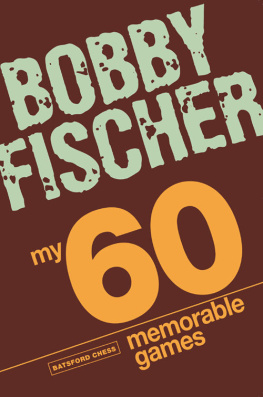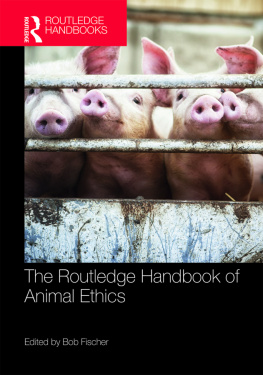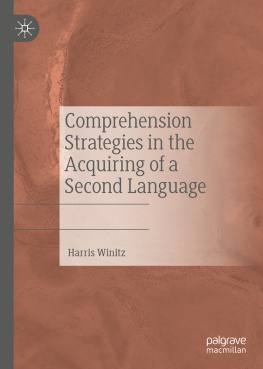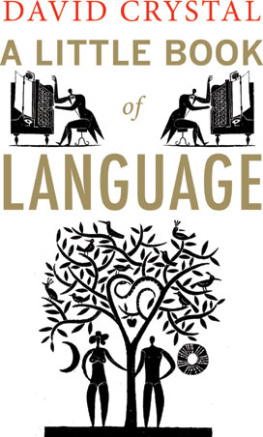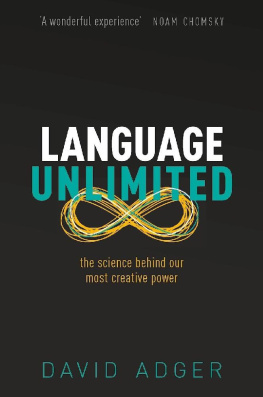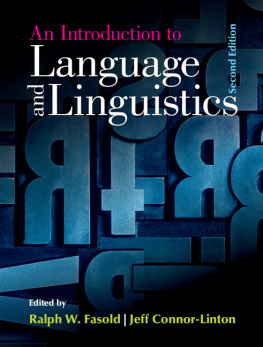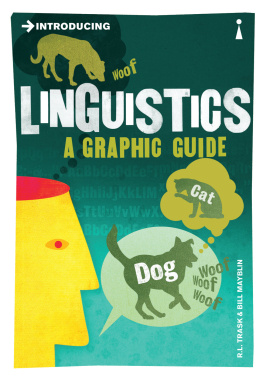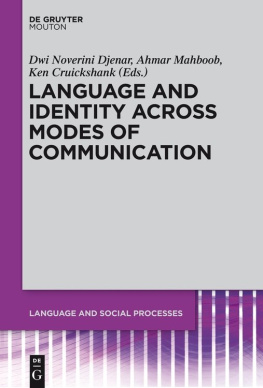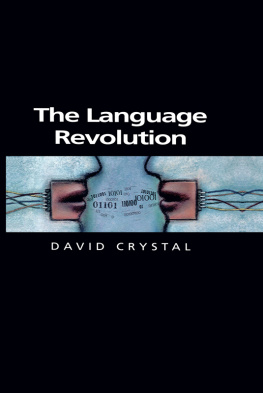GLOBALITIES is a series which reinterprets world history in a concise yet thoughtful way, looking at major issues over large time-spans and political spaces; such issues can be political, ecological, scientific, technological or intellectual. Rather than adopting a narrow chronological or geographical approach, books in the series are conceptual in focus yet present an array of historical data to justify their arguments. They often involve a multi-disciplinary approach, juxtaposing different subject-areas such as economics and religion or literature and politics.
No part of this publication may be reproduced, stored in a retrieval system, or transmitted, in any form or by any means, electronic, mechanical, photocopying, recording or otherwise without the prior permission of the publishers.
Page references in the Photo Acknowledgements and Index match the printed edition of this book.
Preface
This book is an introduction to a history of language. Addressing the topic in its broadest sense, its intention is to prepare someone, who is perhaps only generally familiar with foreign languages and language study, for professional linguistic tuition. In this sense, the present volume is a useful preliminary reading before commencing a university or college introductory linguistics course. No previous training in linguistics is needed to read this book. It requires no foreknowledge of special linguistic terminology or of particular linguistic methods.
As a history of language in general, this overview differs greatly from traditional linguistic histories that is, from formal descriptions of linguistic change in known or reconstructed human languages. It goes beyond human restrictions to include animal languages. It is a short, concise account of the historical significance of language in global terms.
The first chapter begins with Nature and the past; the final chapter ends with Technology and the future. This introductory history also commences with macro issues and proceeds to micro issues: from the languages of all animates to those specifically of primates; from those of Homo sapiens in general to macro families of human languages; and from specific families of languages to our new global societys usage of language and the possible future of English as humankind begins colonizing the Solar System. It is a story of the commonplace and the unique, featuring the natural worlds most fascinating faculty: language.
The many facets of what humankind means by this amorphous word language, with its two dozen different definitions, and even more connotations in specific contexts, will become evident as this introduction to a history of language progresses. The current formal definition of language is experiencing a semantic change too, with language no longer the exclusive franchise of Homo sapiens. It is now appreciated that any living being, in any epoch, that has used some means of conveying information to other animates has used language of some sort. Language is apparently a universal faculty.
It would be absurd to claim that, Someone, somewhere, uttered the first word. And someone else understood. At present such prose might be especially appealing. But its message is historically invalid, as we now realize. Language did not begin. Language, in all its myriad forms, evolved over hundreds of millions of years. Only at the end of this protracted evolution did language, essentially an anthropomorphic concept, appear in the form that modern humans can identify with and better understand.
A history of language must include non-human language, then, as has been revealed particularly in groundbreaking avian, cetacean and primate experiments conducted since the 1960s. Primordial forms of language still exist throughout the world, and only now are being recognized as such, principally as a result of modern technology that makes use of sensitive monitoring equipment in order to register the hitherto unperceived communications of the natural world.
Early on, hominids turned into talking beings, too. It is this story of emerging human language, and of the subsequent evolution of human languages, that comprises the principal theme of this book. There remain no definite answers to the major questions concerning human language: What is language? How does language relate to other intellectual abilities? How does human language differ from non-hominid communication? One of the purposes of a history of language is to find ways to answer these and similar questions.
This book does not address the theoretical specifics of linguistic evolution. The topic is mentioned, but only within a larger history of language in general, as a global overview. For in-depth coverage of specific theoretical controversies the origin of words, the emergence of syntax and so forth relevant texts are cited in the References and Bibliography. The evolution of the human brains ability to process specific vocal references is a similarly fascinating field which, unfortunately, is beyond the scope of this introduction to a history of language.
Jeremy Black suggested I should write this book, and I am extremely grateful to him for the idea and his inimitable support. Thanks are owing also to Michael Leaman of Reaktion Books, who kindly discussed the specifics of the project with me and offered many constructive comments and suggestions.
A special debt is owed, too, to many special people who have played an important role, each in his or her distinctive way, in my linguistic and philological career. Their profound knowledge of languages, the science of linguistics and/or philology over the past thirty years have influenced, shaped and honed my linguistic and philological knowledge and beliefs. Out of the many who deserve mention, I should like to express my indebtedness particularly to Eli Sobel (), Noam Chomsky, Raimo Antilla, Theo Vennemann, Terrence Wilbur, Stephen Schwartz, Arthur Groos, Thomas Barthel (), H. G. A. Hughes, Margaret Orbell, Bruce Biggs, Andrew Pawley, Malcolm Ross, Ross Clark, Ray Harlow, Terry Crowley, Albert Schtz, John Charlot and Jack Ward.
And a very special thanks to Jean Aitchison, too, for showing all of us how one should write about language.
Above all, my wife Taki was both pillar and candle.
Steven Roger Fischer
Waiheke Island, New Zealand
January 1999
ONE
Animal Communication and Language
Earths earliest organisms evolved primitive mechanisms of exchange capable of informing of species, gender and intent. This conveyance occurred through what was then natures most sophisticated medium: chemocommunication. Continuous need over millions of years to contact another of the same evolving species in order to procreate necessitated ever more complex methods of communication. Out of this evolutionary process language in its broadest sense was born.


